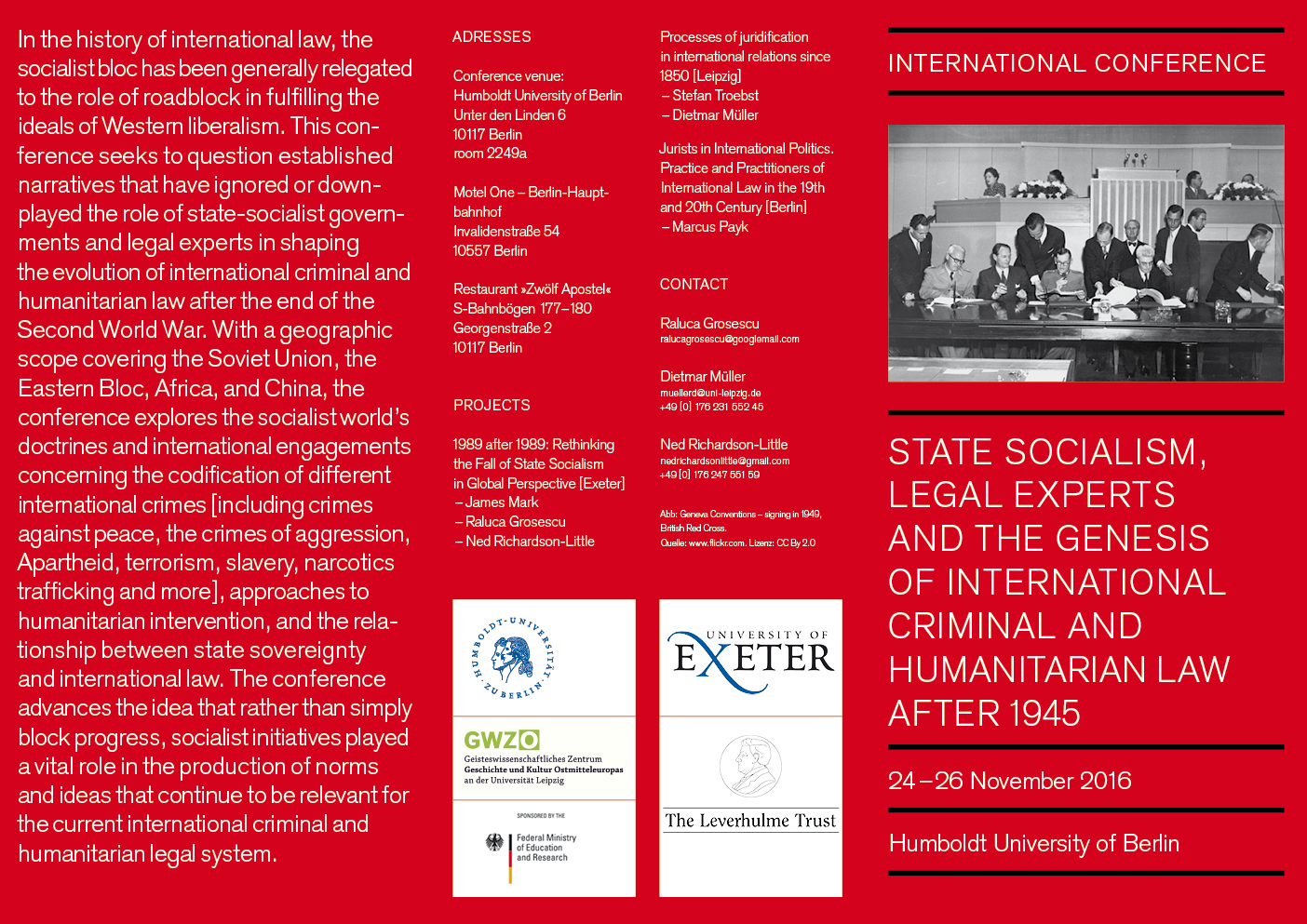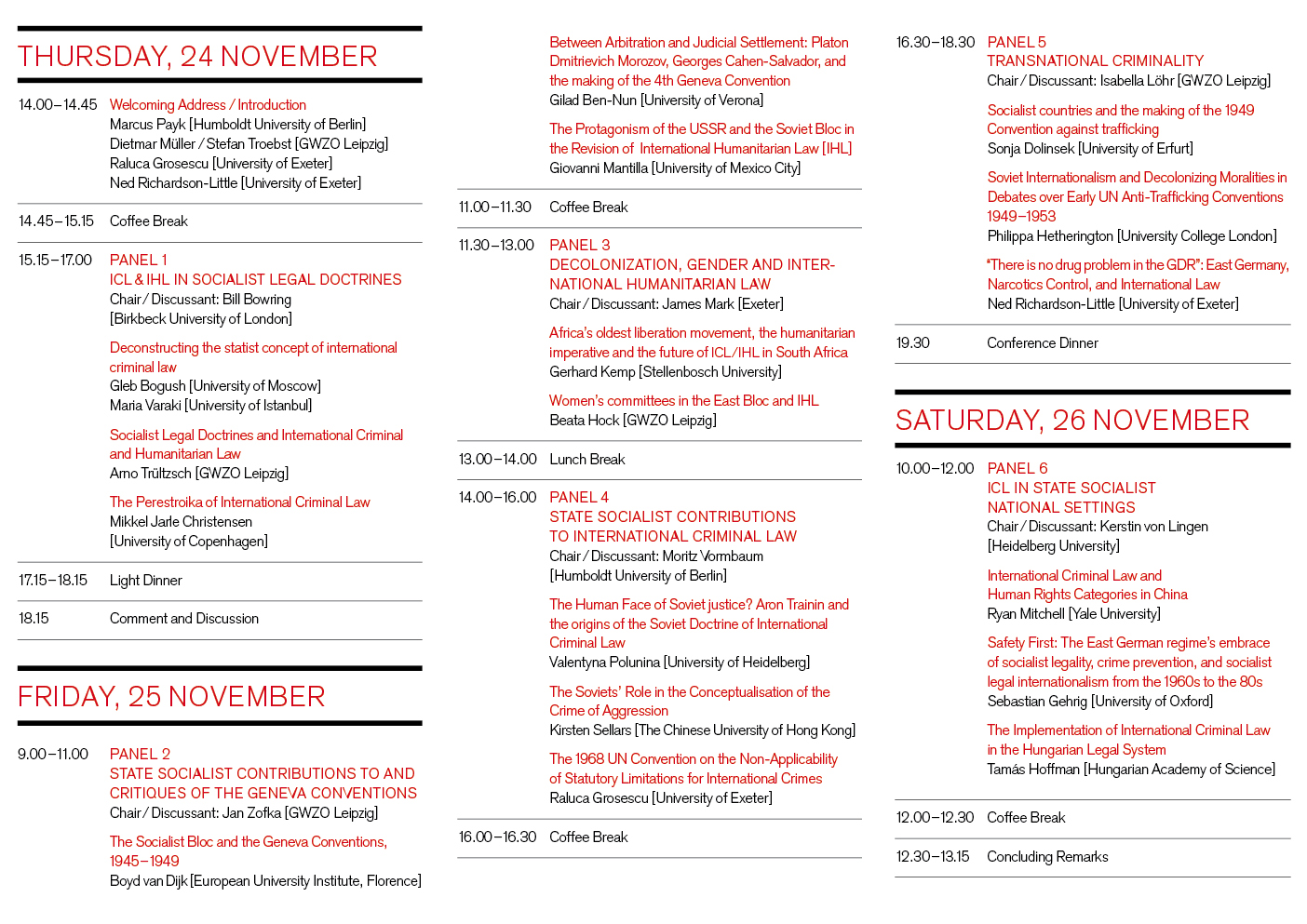State Socialism & International Criminal & Humanitarian Law after 1945 Conference Programme
Posted on 15 November, 2016 in1989 after 1989 Eastern Europe International Criminal Law International Humanitarian Law Socialism South Africa Transitional justice

State Socialism, Legal Experts and the Genesis of International Criminal and Humanitarian Law after 1945
November 24-26, 2016
 Conference Venue:
Conference Venue:
Humboldt University of Berlin
Unter den Linden 6
10117 Berlin
Room 2249a
The programme for our international collaborative conference with the Leipzig Centre for the History and Culture of East-Central Europe (GWZO), and the Humboldt University of Berlin is now available. It will take place on the 24-26 November, 2016 at Unter den Linden 6, Room 2249a, Humboldt University of Berlin, Germany.
It brings together 3 research projects – 1989 after 1989, Processes of Juridification in International Relations since 1850 based at Leipzig and Jurists in International Politics Practice and Practitioners of International Law in the 19th and 20th Century based in Berlin.
Conference Synopsis
In the history of international law, the socialist bloc has been generally relegated to the role of roadblock in fulfilling the ideals of Western liberalism. This conference seeks to question established narratives that have ignored or downplayed the role of state-socialist governments and legal experts in shaping the evolution of international criminal and humanitarian law after the end of the Second World War. With a geographic scope covering the Soviet Union, the Eastern Bloc, Africa, and China, the conference explores the socialist world’s doctrines and international engagements concerning the codification of different international crimes (including crimes against peace, the crimes of aggression, Apartheid, terrorism, slavery, narcotics trafficking and more), approaches to humanitarian intervention, and the relationship between state sovereignty and international law. The conference advances the idea that rather than simply block progress, socialist initiatives played a vital role in the production of norms and ideas that continue to be relevant for the current international criminal and humanitarian legal system.
The conference commences at 14:00 on the 24 November with a welcome address and introduction from the conference organisers – Marcus Payk, Humboldt University of Berlin; Dietmar Mueller and Stefan Troebst, GWZO Leipzig; Raluca Grosescu, University of Exeter and Ned Richardson-Little, University of Exeter. Papers will then be presented that deal with International Criminal Law and International Humanitarian Law in socialist legal doctrines.
Panels on the following day will include papers on state socialist contributions to and critiques of the Geneva Conventions; decolonisation, gender, and International Humanitarian Law, state socialist contributions to International Criminal Law; and Transnational Criminality. The final day will debate International Criminal Law in state socialist national settings and will include case studies from China and Hungary.
To register your interest in attending this conference please contact Raluca Grosescu and Dietmar Mueller
More information on the conference can be found on our conference pages.
CFP: State Socialism, Legal Experts & the Genesis of International Criminal & Humanitarian Law after 1945
Posted on 3 May, 2016 in1989 1989 after 1989 Cold War Communism East Asia Eastern Europe Human Rights International Criminal Law International Humanitarian Law Latin America Post Socialism Socialism Socialist Elites South Africa

Humboldt University of Berlin
The University of Exeter, the Leipzig Centre for the History and Culture of East-Central Europe (GWZO), and the Humboldt University of Berlin
24 – 26 November 2016
Call for Papers Deadline: 15 June 2016
State Socialism, Legal Experts and the Genesis of International Criminal and Humanitarian Law after 1945
In the history of international law, the socialist bloc has been generally relegated to the role of roadblock to the fulfillment of the ideals of Western liberalism. Scholars of international criminal law (ICL) and international humanitarian law (IHL) have often dismissed the contributions of socialist legal initiatives as little more than Cold War propaganda and thus irrelevant to understanding the historical evolution of judicial norms and the modern international system. The establishment of different international tribunals since the collapse of the Soviet Union has only reinforced the notion that the socialist world was little more than an impediment to progress. Nevertheless, the American-led global war on terror has done much to call into question Western commitment to the laws of war.
This conference seeks to explore the role of state-socialist intellectuals, experts and governments in shaping the evolution of ICL and IHL since the end of the Second World War. Actors from Eastern Europe, the USSR, and East Asian and African socialist states actively participated in international debates regarding international legal norms, the meaning of state sovereignty, and in the negotiation of all major ICL and IHL conventions after 1945. In various cases the socialist bloc was often more enthusiastic, and timely, in supporting and ratifying international legal agreements than Western governments, even if these initiatives were inseparable from political agendas. Although they systematically opposed the creation of international tribunals, experts from socialist countries led the way in many areas, such as the codification of crimes against peace and Apartheid or the elimination of statutory limitations for major ICL offences. The socialist world participated also in debates over the international legal status of drug conflicts and revolutionary groups funded by narcotics trafficking. Deliberations on the criminalization of terrorism and the regulation of armed conflicts were closely linked to the politics of “wars of liberation” by socialist forces in Africa, South-East Asia, and Latin America. Socialist legal experts were active participants in transnational epistemic communities and engaged in broader global projects, initiatives, and mobilizations across the Cold War divide.
We encourage proposals on the following topics, and from scholars working on socialist regimes, experts and movements across the world. You are welcome to submit proposals on other themes related to this topic.
- The contributions of the socialist countries and experts to debates on the general principles of ICL and IHL (the relationship between municipal and international law; the sources of ICL; the relationship between state sovereignty, ICL and IHL etc.).
- Socialist challenges to western liberal humanitarian doctrines and conventions (i.e. Peace proposals as alternative to new Geneva conventions, rejection of equality of nations before the law in cases of aggressive war, etc.)
- The role of socialist elites, legal experts, and courts in the development of specific fields of international crimes such as war crimes, genocide, crimes against humanity, and to acts of transnational criminality, such as terrorism, illicit drug trafficking, the arms trade, smuggling of nuclear materials, and trafficking in persons and slavery. The evolution of ICL and IHL discourse, ideas, and initiatives in state-socialist countries.
- The role of the Red Cross and other humanitarian NGOs in the socialist world (i.e. North Vietnamese rejection of ICRC protection for US POWs, the creation of local Red Cross organizations in the Eastern Bloc, etc.)
- Assessments of the continuing legacies and contributions of state socialist traditions of engagement with ICL and IHL on justice processes after 1989/91.
Abstracts of 300-500 words, together with an accompanying short CV should be submitted to Natalie Taylor (N.H.Taylor@exeter.ac.uk) by 15th June 2016.
The selected participants will be notified by 1st July 2016. They are then expected to submit their papers by 1st November 2016.
FUNDING OPPORTUNITIES
Funding opportunities for travel and accommodation are available, but we ask that potential contributors also explore funding opportunities at their home institutions.
The conference is organized by the University of Exeter, the Leipzig Centre for the History and Culture of East-Central Europe (GWZO), and the Humboldt University of Berlin.
This event is kindly supported by Exeter University’s Leverhulme Trust-funded project 1989 after 1989: Rethinking the Fall of State Socialism in Global Perspective, and the German Federal Ministry of Education and Research (BMBF).
Organizers: Raluca Grosescu (Exeter), Dietmar Müller (Leipzig), Marcus Payk (Berlin), Ned Richardson-Little (Exeter), Stefan Troebst (Leipzig), and Natalie Taylor (Exeter).
[Top]






